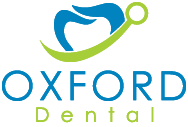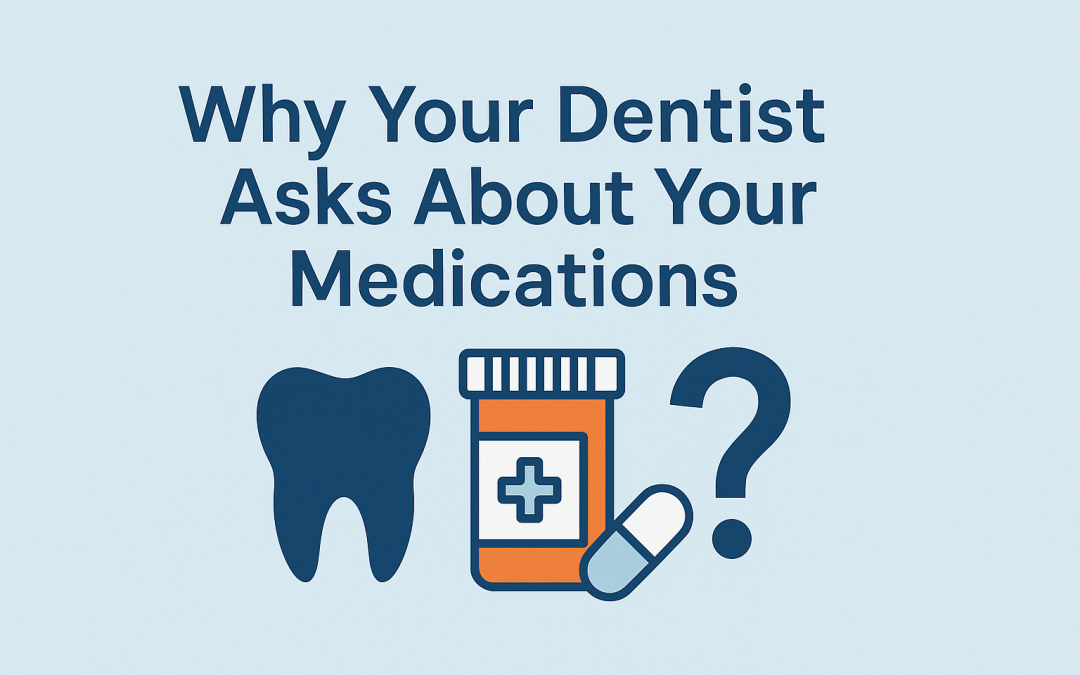You’re at the dentist for a routine cleaning when they ask, “Any new medications?”
Wait… isn’t that something you’d tell your doctor?
Not exactly. The medications you take can affect how your mouth feels, reacts, heals, and behaves — sometimes in ways your dentist needs to know before they ever pick up a tool.
Let’s break down why your dental team is asking, what they’re watching for, and how sharing the right info can save you time, discomfort, and complications.
How Medications Affect Your Mouth (More Than You Think)
Many medications, even the over-the-counter kind, can trigger oral side effects. Here’s where they often show up:
-
Dry Mouth (Xerostomia)
Meds for blood pressure, allergies, anxiety, or depression can slow saliva production. Dry mouth is one of the most common drug-related issues dentists see, and it leads to bad breath, tooth decay, and gum problems. -
Increased Bleeding
Blood thinners like aspirin or warfarin can cause unexpected bleeding during cleanings or surgery. Let’s say you’re taking a daily aspirin and forget to mention it. A standard cleaning could lead to excessive bleeding — and your dental team has no idea why. -
Slower Healing
Some medications, like corticosteroids or immunosuppressants, can delay healing after extractions or implants. That makes it critical to plan ahead for procedures involving sutures or surgery. -
Gum Overgrowth
Certain blood pressure drugs (particularly calcium channel blockers) can cause gum swelling or thickening. This side effect makes brushing more difficult, and can lead to deeper oral health issues if unnoticed. -
Supplement Interactions
Even natural products like ginkgo, turmeric, or St. John’s Wort can interfere with bleeding, anesthesia, or healing. Health Canada cautions that these products aren’t as risk-free as people assume.
It’s Not About Oversharing, It’s About Planning Ahead
When your dental team knows what medications or supplements you’re taking, they can:
-
Time appointments around dosage or drug effects
-
Choose techniques or treatments that won’t conflict
-
Offer preventive options (like special rinses for dry mouth)
Clear communication makes for smoother, safer dental visits. It’s not oversharing; it’s helping your team give you the right care the first time.
When It’s Not Just a Dental Issue
Every once in a while, your dentist may spot something that doesn’t look like a dental problem: chronic ulcers, extreme dryness, or abnormal gum texture. In those moments, they may suggest checking in with a local healthcare provider to rule out anything systemic.
That’s not a red flag. It’s part of a whole-health approach that starts with your smile, and branches out if needed.
Final Thoughts: What to Tell Your Dentist
You don’t need a detailed medical file. Just be honest about the basics. Be sure to mention:
-
New or ongoing prescriptions
-
Over-the-counter meds you take regularly
-
Vitamins or herbal supplements
-
Any recent changes to dosage or frequency
Your dental team isn’t trying to be nosy — they’re trying to keep you safe. And the better they understand your health, the better they can protect it.
Have questions before your visit? Not sure if something you’re taking might impact a procedure? Reach out to our team. We’ll walk you through it before you even sit down in the chair.

